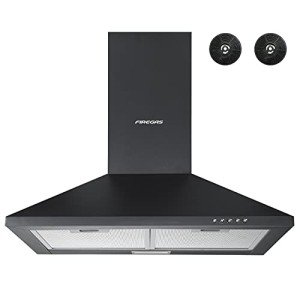
Oven Extractor Fan
FollowOverview
-
Founded Date 10 October 1961
-
Sectors Telecommunications
-
Posted Jobs 0
-
Viewed 3
Company Description
The 10 Most Terrifying Things About Stove Extractor Fan
The Essential Guide to Stove Extractor Fans: Your Ultimate Kitchen Companion
In today’s fast-paced world, kitchen ventilation is often overlooked in favor of aesthetics or home appliance functions. However, a stove extractor fan plays an essential function in keeping a healthy and pleasant cooking environment. This article explores what stove extractor fans are, the different types readily available, their benefits, installation considerations, maintenance suggestions, and answers to common questions.
What is a Stove Extractor Fan?
A stove extractor fan, also understood merely as a range hood or kitchen hood, is an aerating gadget set up above the stove. Its primary function is to eliminate smoke, steam, grease, and cooking smells from the air, improving air quality in your kitchen and home.
Types of Stove Extractor Fans
Stove extractor fans been available in numerous designs and performances. Below is a contrast table summarizing the most typical types:
| Type | Description | Pros | Cons |
|---|---|---|---|
| Wall-Mounted Hoods | Set up against a wall above the stove | Easy to install; elegant | Requires wall space |
| Under-Cabinet Hoods | Installed below kitchen cabinets | Space-saving; practical | Less effective than other types |
| Island Hoods | Suspended above an island stove | 360-degree ventilation; modern | More pricey; needs ceiling assistance |
| Downdraft Hoods | Integrated into the cooktop and turns up when required | Smooth design; inconspicuous | Limited suction; less effective |
| Professional Hoods | Durable, commercial-grade hoods with high CFM | Outstanding for heavy cooking | High cost; typically needs particular setup |
Advantages of Installing a Stove Extractor Fan
-
Improved Air Quality: The main advantage is the elimination of smoke, grease, and odors, resulting in fresher air.
-
Minimized Cooking Odors: No one delights in sticking around smells. An extractor fan effectively removes them, guaranteeing your living area remains pleasant.
-
Reduced Grease Build-up: By capturing grease particles, extractor fans can help keep your kitchen cleaner.
-
Temperature Control: Fans help in minimizing excess heat produced while cooking, making the cooking experience more comfy.
-
Irritant Control: Proper ventilation helps in reducing dust and other irritants in the kitchen, improving general health.
-
Increased Property Value: A well-ventilated kitchen is a selling point for prospective buyers.
Setup Considerations
When installing a stove extractor fan, keep the following consider mind:
-
Size: Choose a hood that extends a minimum of 3 inches beyond each side of your stove for optimum protection.
-
CFM Rating: The CFM (Cubic Feet per Minute) score indicates how much air the fan relocations. Select one that matches your cooking practices– typically, a series of 300-600 CFM is adequate for regular home cooking.
-
Ducted vs. Ductless: Ducted hoods vent smoke outside, while ductless alternatives filter and recirculate the air. Select based on your kitchen layout and requirements.
-
Noise Level: Extractor fans can be noisy. Examine the sones rating (a measurement of viewed loudness) to guarantee it suits your choice.
-
Design and Aesthetics: Choose a style that matches your kitchen design. Hoods come in various finishes like stainless steel, glass, and even custom styles.
Maintenance Tips
To guarantee your stove extractor fan functions efficiently, routine upkeep is necessary. Here are some suggestions:

-
Clean Filters Regularly: Metal filters can normally be washed in warm, soapy water. Change charcoal filters in ductless designs according to producer guidelines.
-
Look For Grease Build-up: Inspect the fan and exhaust duct for grease accumulation. Regular cleansing prevents clogs and fire dangers.
-
Examine the Motor and Blades: Periodically examine the motor for dust accumulation and guarantee the blades are clear from blockages.
-
Change Light Bulbs: If your extractor fan has integrated lighting, check and replace bulbs as needed to guarantee appropriate visibility.
-
Seek Professional Help: If you discover any significant concerns like unusual sounds or decreased suction, think about employing an expert to check and fix the fan.
Frequently Asked Questions (FAQ)
1. Do I need a stove extractor fan if I have windows that I can open while cooking?
Windows can provide some ventilation, however a stove extractor fan is more efficient in removing smoke and odors rapidly. It assists preserve a comfy temperature and air quality regardless of outside conditions.
2. How do I know what size extractor fan I require?
Pick a fan that is at least as wide as your cooking surface, preferably extending a couple of inches beyond it. For exact sizing, consider the CFM ranking based upon your cooking style– utilize the standards above for a quick check.
3. Can I utilize an extractor fan without ductwork?
Yes, ductless extractors filter air and recirculate it back into the kitchen. They are perfect for houses or kitchens without outside walls. However, they may not be as reliable as ducted types for heavy cooking.
4. How loud are stove extractor fans?
Sound levels vary by model. Check the sones rating when shopping; lower sones suggest quieter operation. Most modern fans are designed to decrease sound.
5. How frequently should I clean my stove extractor fan?
Tidy the metal grease filters each month and change charcoal filters for ductless models every four to six months, or as advised by the producer.
A stove extractor fan is a crucial addition to any kitchen, providing numerous benefits ranging from air quality enhancement to aesthetic appeal. Understanding the types, advantages, installation factors to consider, and maintenance of these gadgets can help you make an informed option for your kitchen. By purchasing the right design and keeping it well, you can take pleasure in a cleaner, much healthier cooking environment for years to come. Whether you are an expert chef or an enthusiastic home cook, having a dependable stove extractor fan can substantially raise your cooking experience.


